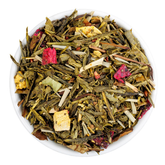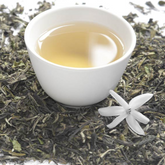For millennia, tea has been a good many things to innumerable people, whether a remedy for illness, a ritual for royals, a morning pick-me-up, or an evening indulgence. Nearly the most consumed beverage around the world – second only to water – tea comes to us in many forms and brings with it a variety of perks.
Academic institutions, medical practitioners and even the staunchest of naturalists all agree on the many ways in which tea can help the human body, from cardiovascular health and cognition to a good night’s sleep and an overall sense of calm.
As studies emerge from respected medical journals around the globe, we learn more and more about the possibilities a simple cup of tea contains.
While none of the following information should be substituted for professional medical advice, it may unlock some new reasons to love the tea you already enjoy, or perhaps you’ll be encouraged to discover something new. So, read on to familiarize yourself with the health benefits of tea in all its glorious forms.
ANTIOXIDANTS: NATURE'S LITTLE HELPERS
No matter how wellness-minded we may be, the world can toss plenty of toxins into our path, from environmental chemicals to dietary indiscretions. As a result, we can produce unstable molecules called oxidants, or free radicals, which are known to damage healthy cells. Our bodies may respond in kind with illness, organ disease, immune system degradation, and other consequences. Antioxidants, however, can help us defend ourselves against the effects of free radicals by binding with them and keeping them from harming our cells. That’s where tea comes into play: packed with antioxidants, it can act as a powerful tool to protect us from the damage free radicals can cause on their own.
Many teas are natural sources of healthy antioxidants.
Because of the way it's processed, green tea is packed with antioxidants, and in particular, matcha is an excellent source of antioxidants since it involves the consumption of whole green tea leaves, stone-ground into a fine powder and incorporated fully into the drink rather than steeped and discarded.
BENEFIT 1: HEART HEALTH
Studies indicate that tea can help our hearts in a number of ways, including lowering LDL cholesterol (also known as “bad cholesterol”). It can improve the ability of the lining in our blood vessels to expand when our blood flow increases during exercise or moments of excitement. It’s also been suggested that tea may help to lower our blood pressure.
Drinking green tea each day is an especially helpful ritual for supporting heart health, especially when it replaces coffee, which can raise blood pressure and encourage anxious thoughts and jitters. As a replacement, green tea delivers a strong but subtle boost of energy without the shakes thanks to an amino acid called L-Theanine, which takes the edge off of the caffeine. This results in a sense of calm focus and presence without a crash awaiting on the other side and is a beneficial habit for the cardiovascular system in the long-term, too.
BENEFIT 2: IMMUNE SYSTEM
The complex internal network that acts as our defense mechanism against disease and infection – our immune system – can benefit greatly from moderate daily tea consumption. L-Theanine, an amino acid and antioxidant present in tea, is thought by researchers to prime the immune system to help it fight infection, bacteria, viruses, and fungi. Likewise, tea is rich in vitamins and minerals such as B1, B2, B6, C, folic acid, magnesium, potassium, and zinc, each of which benefits the immune system and, together, deliver a multifunctional boost.
BENEFIT 3: COGNITION AND CALMNESS
The amino acids in tea can help us reach a calmer mental state while retaining or even sharpening our level of alertness. This effect can last for three to four hours after consumption.
BENEFIT 4: CANCER
While research on tea’s effects on cancer risk is still developing, some promising notes are beginning to emerge. This is one of the most active areas of modern research on the subject of tea and its effects on the human body.
BENEFIT 5: BREATH OF FRESH AIR
Tea contains natural fluoride, which encourages healthy tooth enamel, and the flavonoids in tea may slow the formation of plaque caused by oral bacteria, thereby keeping our teeth cleaner and our breath fresher as a result.
BENEFIT 6: BODY WEIGHT
As tea has no calories, substituting unsweetened tea in lieu of sugary drinks like soda and juice can help us cut our daily intake of what nutritionists' call “empty calories,” – i.e., consumables that give us short-term energy without any health benefits. Tea is also thought to aid metabolism, the chemical process through which we turn what we eat and drink into life-sustaining energy.
Tea offers a comforting alternative to sweets and sodas.
BENEFIT 7: BONE HEALTH
Strong bones may also be one of the long-term health benefits of regular tea consumption. A study in the American Journal of Clinical Nutrition found that older women who were tea drinkers had higher bone mineral density (BMD) than non-tea drinkers. Separate studies have suggested that green tea’s bioactive compounds have osteo-protective properties, helping mitigate bone loss and prevent fractures later in life.















